The Higher Education Council (HEC) in Bahrain: Ensuring Quality and Excellence in Higher Ed Institutions

It is right now the era of quality, credibility, and reputation in the Higher education sector and that’s exactly why HEIs in Bahrain are rushing towards gaining accreditation like the Higher Education Council (HEC). This hype is due to several reasons such as meeting established standards and offering high-quality academic programs, enhancing reputation worldwide and attracting more students, increasing credibility, funding opportunities, and inviting global recognition.
This post is all about HEC - let’s explore its doings, step-by-step process, the committee involved in accreditation, and how institutions like yours should prepare to attain a good grade.
What is the Higher Education Council (HEC) in Bahrain?
The HEC is a government-affiliated organization that was established to oversee the development of the higher education sector in Bahrain. The council works closely with higher education institutions, government agencies, and other stakeholders to ensure that the country's higher education system meets international standards of quality and excellence. The HEC's primary role is to evaluate and accredit higher education institutions and programs, providing students with a reliable benchmark for the quality of their education.
HEC's three crucial mandates are enhancing university performance, observing and assessing service, and governing new study programs.
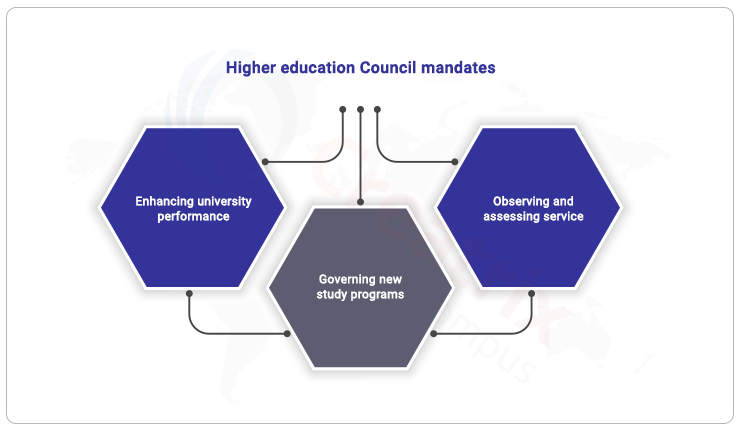
The HEC also allocates funding for higher education institutions and provides funding opportunities for students, such as scholarships. Additionally, the HEC encourages collaboration between higher education institutions and industry, supports and promotes research in higher education, and works to enhance the international visibility of Bahrain's higher education system.
The HEC is concerned with university affairs from a variety of perspectives, including administrative, scientific, research, and students. It also establishes the conditions and standards for the licensing of various higher education institutions, including private institutions, prepares annual reports on the performance of higher education issued by higher education institutions and competent governmental authorities, recommends appropriate remedies for such performance and actions for its development, and creates annual reports for the cabinet on the status of higher education and scientific research.
History and development of HEC in Bahrain
The history and development of the Higher Education Council (HEC) in Bahrain can be traced back to the late 1990s and early 2000s when the government of Bahrain recognized the importance of developing a strong and effective higher education system to support the country's economic and social development.
In 2006, the HEC was established as a government body responsible for overseeing and regulating higher education in Bahrain. Over the years, the HEC has played a key role in developing and promoting the higher education system in the country, by implementing policies and initiatives to improve the quality of education, encouraging collaboration between higher education institutions and industry, and providing funding opportunities for students and institutions.
The council has ten other members and the minister of education serves as its chair. Professor Riyad Hamzah, who was appointed to this position in May 2011, serves as the HEC's Secretary General.
In recent years, the HEC has been working to enhance the international visibility of Bahrain's higher education system and to promote the country as a hub for education and research. It has also been working to promote the development of new academic programs and the implementation of new pedagogical approaches in higher education institutions.
The importance of the Higher Education Council
Higher education is a critical component of any country's economic and social development, and the role of accreditation bodies in maintaining the quality of higher education institutions cannot be overstated. In Bahrain, the Higher Education Council (HEC) is the main accreditation body responsible for ensuring the quality of higher education institutions and programs.
For higher education institutions in Bahrain, the HEC accreditation process is an important step in ensuring the quality and recognition of their programs. Accreditation from the HEC ensures that an institution meets a set of rigorous standards related to program quality, faculty qualifications, and student support services. Accreditation from the HEC also helps higher education institutions attract students and build a strong reputation, as well as gain recognition from other international accreditation bodies.
The HEC's accreditation process is designed to be transparent, fair, and rigorous, with a focus on continuous improvement. The council evaluates institutions based on a number of key criteria, including the quality of teaching and learning, the effectiveness of research and innovation, and the level of student support services. The HEC also evaluates the institution's overall management and governance, including its financial stability, facilities, and human resources.
For heads of accreditation or quality in higher education institutions, the HEC accreditation process provides an important opportunity to assess their institution's strengths and weaknesses and to identify areas for improvement.
The HEC provides guidance and support throughout the accreditation process, helping institutions to meet the necessary standards and achieve accreditation.
Key responsibilities and functions of HEC
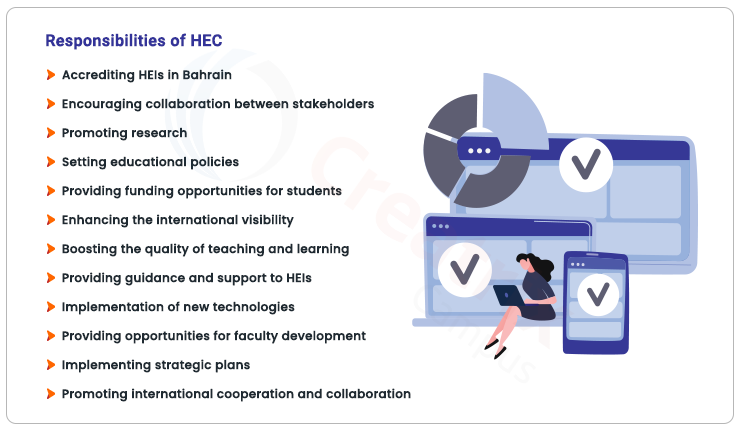
The Higher Education Council (HEC) in Bahrain has several key responsibilities and functions to perform which include;
- Accrediting higher education institutions in Bahrain, ensuring that they meet high standards of quality, and providing students with a high-quality education.
- Encouraging collaboration between higher education institutions and industry
- Supporting and promoting research in higher education
- Setting educational policies and standards for higher education institutions in Bahrain.
- Allocating funding for higher education institutions and providing funding opportunities for students, such as scholarships.
- Enhancing the international visibility of Bahrain's higher education system and promoting the country as a hub for education and research.
- Boosting the quality of teaching and learning in higher education institutions and supporting initiatives to promote student success and development.
- Providing guidance and support to institutions in the development of their academic programs and the implementation of new technologies and pedagogical approaches.
- Providing opportunities for faculty development, including training and professional development programs, to help faculty members stay current in their fields and provide high-quality instruction to students.
- Developing and implementing strategic plans for higher education in Bahrain, ensuring that the sector is well-coordinated and effective.
- Promoting international cooperation and collaboration in higher education, helping to expand opportunities for students and faculty, and to promote the global competitiveness of higher education in Bahrain.
Criteria and standards of HEC for higher education institutions
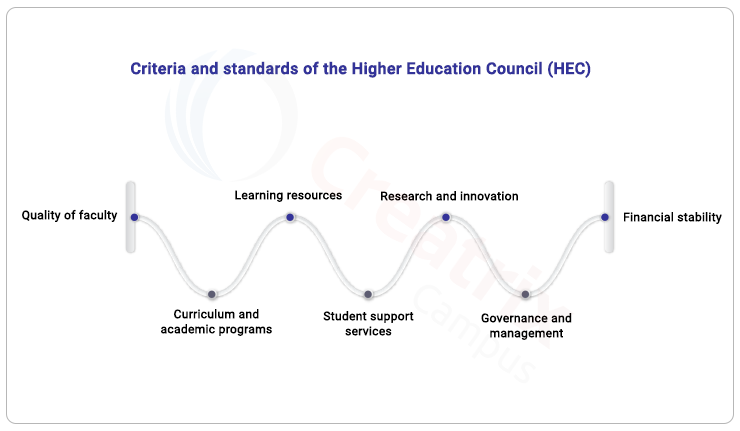
The Higher Education Council (HEC) in Bahrain has established specific criteria for higher education institutions in the country, which institutions must meet in order to be accredited by the HEC. They include;
Quality of faculty: The quality of faculty and their qualifications is a key factor in the accreditation process, and the HEC evaluates the qualifications and experience of the faculty members at each institution.
Curriculum and academic programs: The HEC evaluates the curriculum and academic programs offered by each institution, ensuring that they meet established standards and that they provide students with a high-quality education.
Learning resources: The HEC assesses the availability and quality of learning resources, such as libraries, computer labs, and other technology resources, at each institution.
Student support services: The HEC evaluates the availability and quality of student support services, such as counseling and career services, at each institution.
Research and innovation: The HEC evaluates the research and innovation activities of each institution, including the extent to which institutions engage in research and collaborate with industry.
Governance and management: The HEC assesses the governance and management of each institution, evaluating the processes and systems in place to ensure the effective and efficient operation of the institution.
Financial stability: The HEC assesses the financial stability of each institution, ensuring that they have adequate resources and that they are financially sustainable.
Step-by-step process of the HEC Accreditation
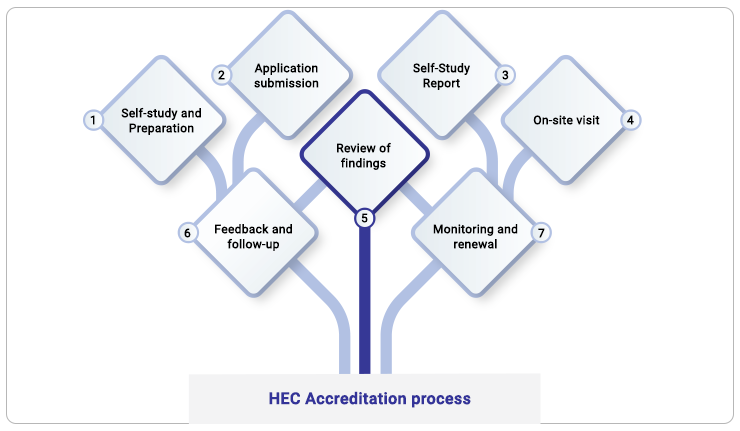
The Higher Education Council (HEC) in Bahrain has a specific process for accrediting higher education institutions in the country.
The steps in this process are as follows:
Self-study and Preparation: The higher education institution begins by preparing for the accreditation process, including gathering the necessary information and data to support its accreditation application.
Application submission: The higher education institution submits its accreditation application to the HEC, which includes information about the institution's faculty, programs, resources, and other key aspects of the institution.
Self-Study Report: The higher education institution prepares a self-study report, which provides detailed information about the institution and its operations, including information about how it meets the criteria established by the HEC.
On-site visit: A team of experts from the HEC visits the institution to conduct an on-site evaluation of the institution and its operations. This includes a review of the institution's facilities, programs, and other key aspects.
Review of findings: The HEC reviews the findings of the on-site evaluation and makes a determination about the accreditation status of the institution.
Feedback and follow-up: The HEC provides feedback to the institution regarding its accreditation status, including any areas for improvement. The institution must then take any necessary actions to address any issues identified by the HEC.
Monitoring and renewal: The HEC regularly monitors the institution to ensure that it continues to meet the established criteria for accreditation. Accreditation must be renewed on a regular basis, typically every 5-7 years, to ensure that the institution continues to meet the standards established by the HEC.
Tips for institutions to easily attain HEC Accreditation
Higher education institutions can increase their chances of successfully attaining accreditation from the HEC and of maintaining high standards in the years to come by following these tips and tricks.
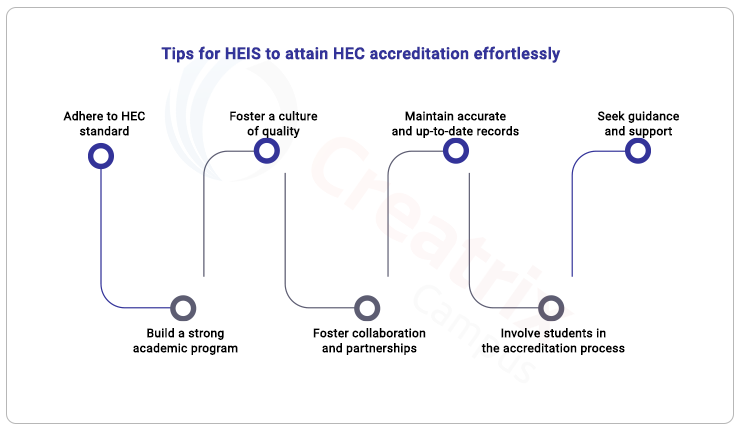
- Familiarize yourself with the criteria and standards set by the HEC and ensure that your institution meets or exceeds these requirements.
- Offer a comprehensive and rigorous academic program that is aligned with the needs of the workforce and the wider community.
- Promote a culture of quality and excellence within your institution, encouraging faculty and staff to continually strive for improvement.
- Build strong partnerships with government agencies, industry, and other higher education institutions to enhance your institution's reputation and capabilities.
- Keep accurate and up-to-date records of all aspects of your institution, including student enrolment, finances, and academic program offerings.
- Engage students in the accreditation process, soliciting their feedback and using it to make improvements to your institution.
- Seek guidance and support from the HEC, attend training and workshops, and seek advice on specific aspects of the accreditation process.
- Get hold of an accreditation software that does most of the back-breaking job for you.
Benefits of HEC to students, institutions, and faculty
Benefits to Students
Improved quality of education: HEC's accreditation process and quality assurance standards help ensure that students receive a high-quality education from accredited institutions.
Access to resources: HEC provides support and services to students, including counseling and career services, to help them succeed in their studies.
Assured employment opportunities: Accreditation by the HEC can enhance the reputation of a higher education institution, making it more attractive to employers and improving employment prospects for students.
Benefits to Institutions
Better quality: HEC's accreditation process helps institutions to maintain high standards of quality, providing students with a high-quality education.
Increased reputation: Accreditation by the HEC can enhance the reputation of a higher education institution, making it more attractive to students, faculty, and potential partners.
Enhanced resource allocation: Accreditation by the HEC can help higher education institutions to secure funding and resources, as institutions that are accredited are often seen as more reliable and trustworthy.
Benefits to Faculty
Professional development: The HEC provides opportunities for faculty development, including training and professional development programs, to help faculty members stay current in their fields and provide high-quality instruction to students.
Improved working conditions: The HEC's focus on quality and accreditation can help institutions to improve working conditions for faculty members, providing them with the resources and support they need to be effective in their jobs.
Better employment: Accreditation by the HEC can enhance the reputation of a higher education institution, making it more attractive to employers and improving employment prospects for faculty members.
Challenges institutions face during HEC
With new technologies and pedagogical approaches emerging all the time, higher education is undergoing rapid change. The HEIs must keep up with these changes to adapt and remain competitive.
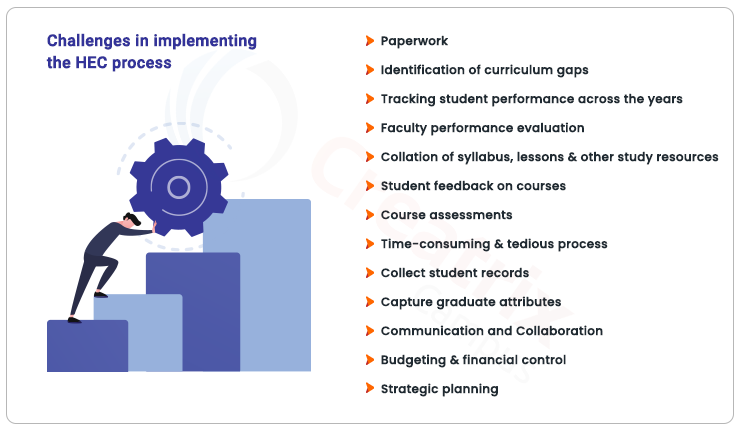
Some of the common challenges faced by HEIs during the HEC process include;
Meeting quality standards: HEIs must meet strict quality standards set by the HEC, which can be challenging, especially for those with limited resources.
Documentation and data collection: The HEC requires detailed documentation and data collection, which can be time-consuming and difficult to manage.
Faculty qualifications: Ensuring that faculty members have the required qualifications and experience can be a challenge, especially for institutions with limited budgets for hiring and training.
Continuous improvement: Maintaining accreditation requires continuous improvement, which can be difficult for institutions with limited resources and personnel.
Keeping up with changing standards: The HEC may change its standards and expectations over time, requiring HEIs to continually adapt and improve their programs.
Balancing accreditation requirements with institutional goals: HEIs must balance their institutional goals with the requirements of the HEC accreditation process, which can be challenging.
How can accreditation software speed up the HEC process?
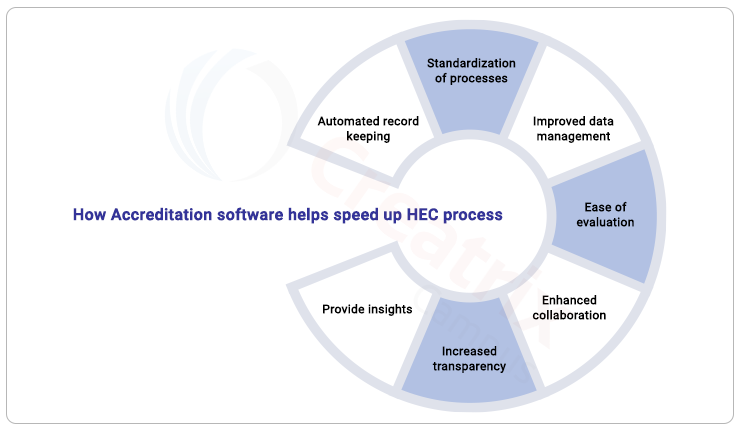
Accreditation software can streamline the Higher Education Council (HEC) process by providing several benefits including;
- Automating the process of record keeping and reducing the manual effort required to maintain accurate and up-to-date records.
- Standardize the processes involved in the accreditation process, ensuring that all institutions are evaluated using consistent criteria.
- Improve data management by providing a centralized platform for storing and accessing information about higher education institutions.
- Simplify the evaluation process by allowing HEC officials to quickly and easily access and review relevant information about higher education institutions.
- Facilitate collaboration between higher education institutions and the HEC, enabling institutions to receive real-time feedback on their performance and make necessary improvements.
- Increase transparency in the accreditation process, making it easier for institutions to understand the evaluation criteria and what they need to do to attain accreditation.
- Provide valuable data analytics, helping the HEC to identify trends and make informed decisions about the future of higher education in Bahrain.
How can the Creatrix Accreditation platform help in HEC?
Creatrix Campus provides rock-solid accreditation management software that lets institutions plan any accreditation requirements, delegate tasks to appropriate faculties for efficient data computation, and track the KPIs for continuous improvement, in just a few clicks.
It is SaaS-based so improving your preparation regardless of whether you are managing multiple accreditations across multiple campuses is done seamlessly. Our built-in templates and key performance indicators automatically copy to satisfy different accreditation requirements.
Some of the key features of the Creatrix accreditation platform that help speed up the HEC process are;
- Automation of various tasks such as data collection, record keeping, and evaluation. Standardization of evaluation criteria, improving the accuracy and fairness of the accreditation process.
- Centralized data management for storing and accessing information about higher education institutions, improving data management and reducing the risk of errors.
- Communication tools, facilitate easier collaboration between higher education institutions and the HEC, enabling institutions to receive real-time feedback and make necessary improvements.
- Enhanced reporting capabilities, allowing the HEC to quickly and easily access and analyze data to make informed decisions about the future of higher education in Bahrain.
- Customizable evaluation criteria to help meet the specific needs of the HEC, ensuring that the evaluation criteria are aligned with the goals and objectives of the organization.
- Cost and time-efficient functionality that can save the HEC time and resources by automating repetitive tasks and reducing manual effort.
Final Words
In conclusion, the Higher Education Council (HEC) plays a vital role in promoting and supporting high-quality higher education in Bahrain. It sets standards, provides accreditation, and implements programs and initiatives aimed at improving the quality and accessibility of higher education.
The HEC works closely with higher education institutions, government agencies, industry, and other stakeholders to ensure that the higher education sector is well-coordinated, effective, and responsive to the changing needs of society.
The impact of the HEC on Bahrain's higher education system has been significant, with higher education institutions in the country consistently achieving high standards and producing graduates who are well-prepared for the workforce. The HEC's efforts have helped to build a strong higher education sector in Bahrain, one that is well-equipped to meet the demands of the 21st century. Overall, the HEC's role and impact on Bahrain's higher education system have been positive, contributing to the development of a knowledgeable and skilled workforce and to the long-term prosperity of the country.
Contact our accreditation experts for more details.
Creatrix Campus can automate the accreditation process with the Higher Education Council (HEC) in Bahrain by streamlining and simplifying many of the manual tasks involved. For example, our product can automate the tracking and reporting of accreditation-related activities, ensuring that all deadlines are met and all relevant information is easily accessible in one centralized location. Additionally, our product can provide real-time updates on the status of the accreditation process, enabling organizations to make informed decisions and respond quickly to any changes or requirements. By automating the accreditation process, organizations can save time, reduce the risk of errors, and focus on the core activities that drive their success.



